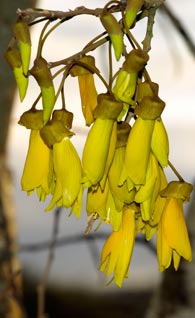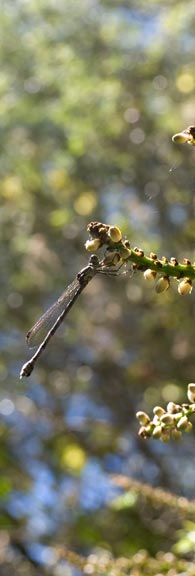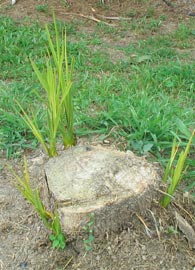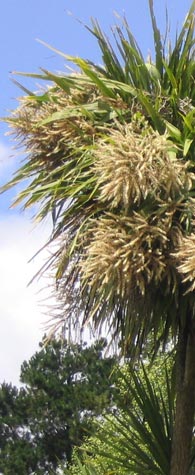|

Moso bamboo
A link with China & Taiwan

Kauri ~
Symbol of nobility & authority

Kōwhai gold
Free to all without mining

Tī blossoms attract a damsel fly
Peace and tranquility ...

Regenerating tī
Symbol of resilience

Tī in full flower
Fragrance
|
What is the meaning of 德馨 ?
Introduction
"Eulogy to my humble abode"
Notes
Parallels from Aotearoa and Samoa
Further Information
The people who first spoke an Austronesian language lived for a time -- no-one knows for how long -- on what is now the Chinese mainland, before crossing to Taiwan from where their descendents and and the languages they developed from this starting point had reached Madagascar in the West, Rapanui (Isla de Pascua) in the East, Hawai'i in the North and Aotearoa in the south by the end of the first millennium AD.
When looking for a suitable logo or icon to represent Te Māra Reo and the larger garden in which it is located, Tūmanako, I remembered that Chinese characters are wonderful embodiments of ideas, so I asked the advice of some Chinese friends as to how to convey the nuance of transcendent hope, which we tried to convey through the name "Tūmanako", and our hope that Te Māra Reo would help to foster scholarship, knowledge of the linguistic history of Aotearoa, and become a little oasis of tranquility in a world that is often too busy for its own good.
I had first focused on "Tūmanako", and I received two suggestions -- the combination of two characters, one, xi (希) less common than the other, wang (望) representing "hope, expectation", or, and they thought better, a combination of the character de (德), connotating "virtue" with either of the characters for "hope". Another friend thought that these suggestions were good, but the suggested order of the characters should be reversed, with "de" preceeding either of the other two.
I consulted a fourth friend, who is well-versed in the Chinese classics about this. He thought carefully about not just my original question, which was whether it mattered which order the characters went in, but the whole context of the meaning of Te Māra Reo, and came up with what I think is a truly wonderful suggestion -- that instead I use the two characters in the heading for this page: de, as in the other suggestions, and xin / xing (馨), which evokes the ideas of fragrance, proximate or in the distance, depending on how you read it. The full phrase, 德馨, appears on some pages, and the character 馨 represents it as the "favicon" on many others .
However, there is much more to it than just that. The phrase is actually a quotation from a poem about his home and garden by the famous Tang dynasty poet Liu Yuxi (AD 772-842), which indeed resonates with much of what we are trying to accomplish here.
I think Liu Yuxi would approve of this use of his work: he was one of the few imperial writers and officials of his time who took the cultures of non-Han Chinese seriously, and his poetry was noticeably influenced by the folk literature of the areas where he worked or lived. He was often in trouble for making anti-establishment comments in his poems, and spent several periods of exile in remote districts, but Liu Yuxi did not allow this to mute his criticism.
Hoki atu ki runga - Return to the top of the page
Here is the poem from which the quotation is taken, followed by a translation in English.
劉禹錫「陋室銘」的譯文
陋室銘
劉禹錫
山不在高,有仙則名。水不在深,有龍則靈。斯是陋室,惟吾德馨。苔痕上階綠,
草色入廉青。談笑有鴻儒,往來無白丁。可以調素琴,閱金經。無絲竹之亂耳,無
案牘之勞形。南陽諸葛廬,西蜀子雲亭。孔子云:「何陋之有?」
《A EULOGY ON MY HUMBLE ABODE》
Known will the hills be if tahurangi dwell, no matter high or low; and charmed will the waters be if taniwha hidden, no matter deep or shallow. A humble abode though this is, our virtues make it smell sweet. Verdant are the stone steps overgrown with moss, and green seems the screen as the grass seen through it. We chat and laugh only with great scholars, and the ignorant do not trouble us. I can play the lute and read the great classics; no unpleasant music to grate on my ears, and no red-tape to wear me out. Zhuge’s cottage in Nanyang and Ziyun’s pavillion in Xishu are both as Confucius remarked, “How can a place like this this be shabby?”
Hoki atu ki runga - Return to the top of the page
NOTES.
I have taken some liberties with this translation. The original used "my" where the character 吾 (wu) appears. Since this can also be read as "our", I have done this, and in a few cases where "I" is simply implied, I have used "we" to include everyone who happens to be here, even though the poet was probably talking only about himself.
I thought that the Māori word "Tahurangi" was more appropriate than "fairies" as a translation for 仙 (xian), which refers to a supernatural being like the patupaiaruhe. The Tahurangi were a special and honoured group of such beings, whose presence was associated with fragrance in the air. Taniwha I thought too was a good substitute for dragon as a translation for 龍 (long), also a word which has, like fairy, been somewhat devalued in English but which retains a meaning in Māori closer to the Chinese. I also made a few other changes in harmony both with the text and alternative translations which I have found. If you read Chinese, you can decide whether I have departed too far from the sense of the poem. I don't think so.
When I first read it I thought that perhaps the references to Zhuge and Ziyun were politically motivated. They may well have been, but it would have been by holding up their own unpretentious dwellings, like his, as examples of how in a home simplicity and unpretentiousness were more important and inherently beautiful than luxury, if people of integrity lived there. Zhuge (181-234 AD) was a renowned strategist and political and military leader, who was known also for his wisdom and humility and had lived in a thatched cottage. Ziyun (53 BC - 18 AD), also known as Yang Xiong, was a philosopher who lived even earlier. Like Liu Yuxi he was a controversial figure and a scholar who did not hesitate to comment critically on the society in which he lived. Nanyang is a city in the interior of Henan Province, about 900km northwest of Shanghai; Xishu is an alternative name for Sichuan Province, in the interior of southern China, where Ziyun spent his life.
The quotation from Confucius is comforting, as I often worry that Te Māra Reo is a bit of a wilderness, and our home is certainly far from "flash", yet our visitors have never thought that this matters.
At this time of the year (November) the excerpt from the poem which my scholar friend recommended is particularly appropriate, as the air is beautifully perfumed by the Tī, flowering unusually prolifically this year [2010], and many other plants with heavily scented flowers.
Hoki atu ki runga - Return to the top of the page
Parallels from Aotearoa and Samoa.
After reading the explanation of the poem by Liu Yuxi, one of my friends sent me this extract on the theme of a tranquil environment from an article on leisure and pastimes by the Māori scholar Reweti Kohere:
Kaore au i te koingo ki nga taone, ki te powaiwai o te tangata, ki te haruru, ki te tatangi, ki te hoihoi. Kaati ano taku hoihoi ko te korihi a nga manu, ko te pupuhi a te hau, ko te haruru o te tai, ko te hiere a te tamariki.
[I don't yearn for the towns, for the hustle and bustle of people, the rumble, clatter and noise. I'm fine with the noise of the birds singing, the wind blowing, the roar of the sea and the sound of children.]
The symbolism of fragrance is beautifully encapsulated in these lines from a classical Samoan song, quoted on the opening page of the book Su'esu'e Manogi: In Search of Fragrance, a collection of writings by Tui Atua Tupua Tamasese Ta'isi with commentaries by other scholars:
Manogi le mosooi ma le lagaali
Faaoso e le sea ma le asi
Ma le sinago ua fenamua'i
The scent of the mosooi and the lagaali
Enhanced by the sea and the asi,
And the sinago which adds to the aroma
of many fragrances
Hoki atu ki runga - Return to the top of the page
Some sources of further information : You can find brief biographies of Liu Yuxi on the Whittier College web site, with two of his poems, and on the the Chinese-English translation magazine Renditions web site. Five poems, including the one featured here, are reproduced (in Chinese characters) on the "China the Beautiful web site. The Internet Encyclopaedia of Philosophy has a very good article on Yang Xiong (Ziyun). Zhuge is featured in an article on the Cultural China site. There is an excellent translation of Liu Yuxi's poem about his home, together with the Chinese text, on the page http://ewanlee.spaces.live.com/.
The article by Reweti Kohere, entitled Nga Ngahau a te Tangata was published in the newspaper Te Toa Takitini, No. 60, 1 August 1926, pp. 441-444. (The extract is on p. 444.)
Su'esu'e Manogi: In Search of Fragrance, Tui Atua Tupua Tamasese Ta'isi and the Samoan Indigenous Reference, edited by Tamasa'ilau Suaalii-Sauni et al., was published by The Centre for Samoan Studies, National University of Samoa, Apia in 2009. The quotation is from the Solo ia Afoafouvale (Afoafouvale's Song) in Augustin Krämer, The Samoa Islands, Vol 1, Honolulu: The University of Hawaii Press, 1994, p.282. The five plant names mentioned are all inherited from Proto Polynesian (PPn) -- follow the links to the Pollex database to get further etymological details (we will eventually have pages devoted to these plants here): Mosooi - Ylang-ylang, "Perfume tree", Cananga odorata - PPn *mosoko from Proto Oceanic (POc) *masoqu, through Proto Central Pacific (PCP) *masokoi; Lagaali - From PCP through PPN *Lagakali (Aglaia sp.), Agalia samoensis, a tree the flowers of which are used for scent; Sea - Parinarium insularum, from POC, PPN *sea; Asi - Fijian sandalwood, Santalum yasi, from POC, PPN *Asi Santalum sp.; Sinago - Pandanus blossoms from PPN *sigano "Pandanus blossom". In several Polynesian languages the cognate word for the fragrant sinago (e.g. Tongan hingano) refers exclusively to the male pandanus flower or tree. The song was published in Agustin Krämer, The Samoa Islands (trans. Dr Theodore Verhaaren), Honolulu: University of Hawaii Press, 1994, p. 282. The line about the sigano is translated by Dr Verhaaren as "And the pandanus blossoms send out fragrance to each other." The more poetic translation quoted above is by Tui Atua Tupua Tamasese. Note that in both the quoted and original text the Samoan word is given as sinago, although the database and dictionary entries record it as sigano. The metathesis for now must be considered an enigma at the bottom of the garden.
Hoki atu ki runga - Return to the top of the page
|

